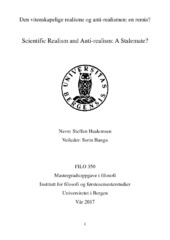Den vitenskapelige realisme og anti-realismen: en remis?
Master thesis
Permanent lenke
https://hdl.handle.net/1956/16504Utgivelsesdato
2017-06-22Metadata
Vis full innførselSamlinger
- Department of Philosophy [240]
Sammendrag
Debatten mellom vitenskapelig realisme og anti-realismen har i den siste tiden ikke vist noen tegn til å bevege seg fremover. Hos realistene ser vi at det fremdeles refereres tilbake til Grover Maxwell og Karl Popper når man skal vise til de mest slagkraftige argumentene for en vitenskapelig realisme, mens det i anti-realistene sin leir i stor hovedsak legges vekk på motargumentene til Larry Laudan og Bas van Frassen. Det er i senere tid gjort forsøk fra begge leire i å legge debatten død i sin fordel, men med manglende suksess. Jeg vil med dette gi et innblikk i argumentene diskusjonen belager seg på, for så å trekke frem det jeg anser å være kjernen til hvorfor debatten ikke beveger seg fremover. Jeg vil også trekke frem hvordan nyere forsøk på å løse konflikten heller har bidratt til å gjøre det vanskeligere enn lettere å avgjøre debatten. The debate between scientific realism and anti-realism has for the last decades showed no real sign of being resolved. In the realist camp one still referes back to Karl Popper and Grover Maxwell when one wishes to argue the case for scientific realism, while in the anti-realist camp, one has turned to the arguments presented by Larry Laudan and Bas van Frassen. There has in more recent times been made attempts by both sides of the argument when it comes to producing arguments to settle the discussion once and for all, but alas, these attempts have been nothing short from futile. In what is to come, I will give an in-depth explanation for the arguments used by both sides of the discussion, before I give my own take on what seems to be the core problems for why the debate is at a stalemate. I will also give an attempt to show how newer takes on the problem have done nothing more than to make the debate harder to dissolve.
